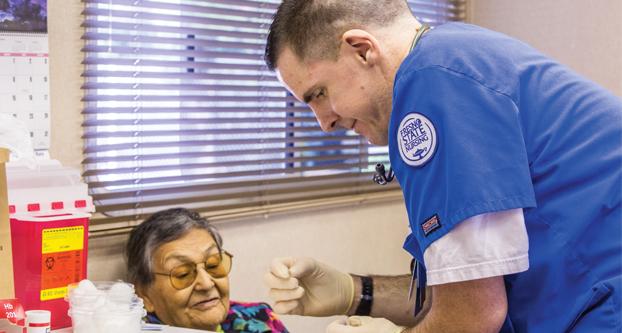Teresa Marquez uses a red walker to make her travels on foot bearable.
But in the rural town of Sanger, not all of her destinations can be reached easily on foot. Even when public transit is an option, the long hours standing, sitting and walking drain her.
“I struggle a lot trying to go to the doctors, “ Marquez said. “Many times, my family is unable to take me, and I have to walk all the way to the doctors. It’s too difficult so, I just won’t go.”
Marquez, like many others in her situation, have an ongoing battle with transportation in order to go to the doctor and stay healthy. The Fresno State School of Nursing Community Health Mobile Unit is combating the void and bringing a clinic to rural communities in Fresno County.
“For a lot of them, their doctors may be in town and there is no really good public transportation from the rural areas in,” explained Dr. Kathi Rindahl, an assistant professor and the School of Nursing’s baccalaureate coordinator. “In some communities, there is no bus that goes all the way out, and if it does, it’s only one time a day.”
Other difficulties those who live in rural communities may face when trying to reach a doctor is the lack of time from working long and odd hours.
“A lot of them can’t get into their doctors because they are working a lot,” Rindahl added. “So sometimes, they know they ran out of their medication, but they can’t get to the physician because they don’t have time. If they take time off work, then they don’t get paid, so there’s a lot of issues.”
The mobile health unit initiative began after the Fresno County of Education Migrant Education Program folded due to budget cuts.
“So the health unit was just sitting in a parking lot and I did not like it,” Rindahl said. “So I wrote a grant so I could get it back out and I could at least get [Bachelors of Science in Nursing Program] students out.”
After getting permission to borrow the unit, Dr. Cyndi Guerra, assistant professor in the School of Nursing, wrote another grant to get master’s nurse practitioner students on board, combining two nursing programs to serve the community.
The free mobile health unit is scheduled to reach rural communities 10 times a semester. This Tuesday, the nursing students were in Sanger doing physicals, checking blood pressure, running urine tests, pregnancy tests, cholesterol testing, screening for diabetes, writing referrals and imparting health education. They are able to see everyone from babies to geriatrics.
“We have to educate them. If they have high blood pressure or diabetes, there is a huge lack of understanding what exactly that means,” Rindahl said. “They don’t completely understand that even though they might feel OK, their blood pressure could be way off the charts. The same goes for diabetes as well, a lot of them don’t understand that the types of food they eat directly affect the sugar levels in their body.”
Socorro Garza, a patient, fell into this category. She had not taken her diabetes medication because she was sick the week before. Rindahl and Guerra along with students explained to her she had to take her medication every day even if she was not feeling well.
“I am grateful they are coming,” Garza said. “If it wasn’t for them, many of us wouldn’t have access to a doctor.”
Yolanda Jimenez, who was another patient among the 16 seen, was struggling to get medical attention. Jimenez only has access to emergency insurance which doesn’t cover the whole cost of a doctor’s visit.
“I wasn’t feeling well and I wanted to go to the doctor but because of the cost I was unsure of going,” Jimenez said. “When I heard on the news that there was going to be a free clinic, I decided to wait.”
Jimenez was worried about her health, but now has peace of mind knowing she had a checkup and received a referral from the nurses.
The experience of working with the rural health patients, the diversity, the culture and the atmosphere is new to the students who are accustomed to working in a hospital or office setting, said Guerra. This opportunity gives them a new perspective.
“I want them to see a different part of nursing outside the hospital,” said Rindahl. “In the nursing program there is good patient and hospital care but the community is actually our biggest patient.”
When students work in this setting they start understanding the health necessities that the person in the community is suffering with, said Rindahl. Then when the students go to the hospitals, they are better able to understand the resources the patient has when they go home.
“A lot of the younger nurses just don’t have much of an idea just what a nurse practitioner does,” said Guerra. “Working alongside the nurse practitioner students and seeing what they do it gives them a better understand of what their whole career path could be.”
Both Guerra and Rindahl hope to see the program evolve and continue for years to come.
The next implementation they are planning is to team up with the physical therapy department and provide balance screening at senior centers.
“Ultimately I would love — this is a dream of mine — when we see clients in the community is for the agricultural department and the nutrition department to come out with us and have a farmers market next to the mobile unit,” Rindahl said. “So when we give people prescriptions for a certain type of food, they can go get the food.”
The Health Mobile Unit’s next stop will be at Reedley Community Center on Oct. 13.

